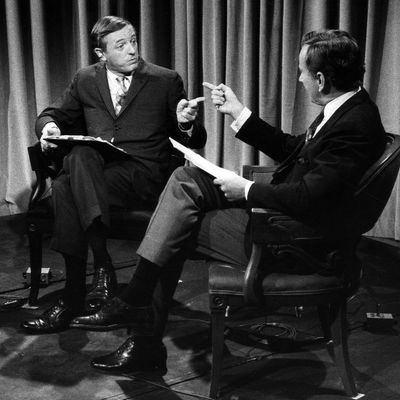
You might see a film about William F. Buckley and Gore Vidal’s ten televised debates during the 1968 presidential conventions as an opportunity to bask in eloquent, pointed repartee. You might also enjoy the spectacle of two of the foremost intellectuals of their time coming very close to physically beating the crap out of each other. You might not expect, however, to find yourself weeping — for the state of the republic and the poisoned media landscape, for the decay of the American social contract. Yet here we are. Robert Gordon and Morgan Neville’s masterful Best of Enemies leaves you with an overwhelming sense of despair. It’s not just a great documentary, it’s a vital one.
The setup is simple, and beautiful — so simple and beautiful that I’m shocked nobody’s tried to make this movie until now. In 1968, the struggling ABC network, dead last behind CBS and NBC (“They’d be fourth, but there were only three,” quips one talking head), didn’t have the resources for the kind of convention coverage that their competitors did. So ABC decided to let the flamboyant, unapologetic Vidal and Buckley — one a dapper left-wing bomb-thrower, the other the very backbone of arch-conservatism — debate the issues of the day. Point-counterpoint. A novel idea at the time for television news.
It was also brilliant, and conniving: Once asked if there was anybody he would never take a stage with, Buckley had said he’d refuse to go up with a Communist, or Gore Vidal. “There was nothing feigned about the mutual antipathy,” chimes in the late Christopher Hitchens. “They really did despise each other.” Vidal prepared for the debates by actually hiring researchers to go over Buckley’s record and his writings; he wanted to destroy the man, in part because he knew that Buckley, possibly the greatest debater of his time, wanted to destroy him.
It showed. The Buckley-Vidal debates made for great television, as the two started off spitting barely veiled invective at one another. Then came what Hitchens calls “the cherry bomb that’s waiting to go off — and finally does”: On the night of the penultimate debate, Vidal, who’d been trying to get under Buckley’s skin the whole time, finally called his opponent a “crypto-Nazi.” Upon which Buckley called him a “queer” and threatened to “sock” him “in the goddamned mouth.” (I highly, highly recommend Jim Holt’s excellent article about the debates, published in New York Magazine this week.)
It quickly became clear that Vidal and Buckley weren’t really locking horns over individual issues, nor were they arguing two different political philosophies. No, they were clashing over something much more existential. Both men were despondent about the state of the country, but in opposite ways. Vidal saw in the chaos around him the signs of imminent, welcome revolution; Buckley saw a rapidly decaying social order that threatened to ruin everything he held dear. Each man’s very being outraged the other. “Their confrontation is about lifestyle,” we’re told. “What kind of people should we be? Their real argument, in front of the public, is who is the better person?”
Gordon and Neville’s film is slick, but not in a shallow way. They’re generous with their archival footage, underlining and undercutting with wit and verve. (At one point, a discussion of Buckley’s morality cuts to footage of him caddishly answering a young female questioner about miniskirts, then cuts to reveal that he’s up on a stage with Woody Allen.) Kelsey Grammer and John Lithgow read passages from the two men’s writing and reminiscences, creating what feels like alternating internal monologues — as if we’re trapped inside their heads. (My favorite detail: Buckley’s description of debate moderator Howard K. Smith as “suave, intelligent, mildly apprehensive … rehearsing with his lips the lines he would presently deliver.”)
Meanwhile, we have the glorious, glorious footage of the actual telecasts themselves. Listen to Vidal say the words “William Buckley, the distinguished thinker” with all the lilting, sing-song contempt of a playground taunt. Listen to Buckley talk about Vidal’s novel Myra Breckinridge with such snide dismissal, it’s like his eyes are rolling their eyes. The drama is all there, and it’s riveting. I remember one of my high-school English teachers, long before YouTube was around, talking about these debates, which he had seen as a kid, and recalling how Buckley had “decked” Vidal. Of course, Buckley did no such thing — he just threatened to. But seeing the footage now, you can understand how someone might remember the event as an actual beat-down, as opposed to a suggested one.
All that archival footage traversing decades, the talking heads, the voice-overs, the debates themselves — it could have easily become an incoherent soup. But the idea of building the film around the telecasts, then using that structure to hop around in Buckley and Vidal’s past and future, gives what we’re watching both immediacy and resonance. Everything else becomes a flashback or a flash-forward from the turbulent present tense of 1968, the country’s past and future all aswirl around these two men hammering away at the very idea of America.
Is that too much? Surely, there was more important stuff going on in and around those convention halls (where, after all, Richard Nixon was being nominated for president and protesters were constantly clashing with police). But Best of Enemies’ true aim is to lament a bygone political discourse. Vidal and Buckley may have started off as representatives of an old-fashioned school of debate, learned and articulate and polite, but by the end of the conventions they wound up unwittingly inventing a new media landscape: one of constant conflict, sustained anger, and barely contained violence. Gordon and Neville find in these two men’s infamous clash a turning point, the moment in time when the networks, the press, the pundits, and even average Americans first realized their taste for political bloodsport. A terrible beauty had been born, as they say. This might be the saddest film of the year.





